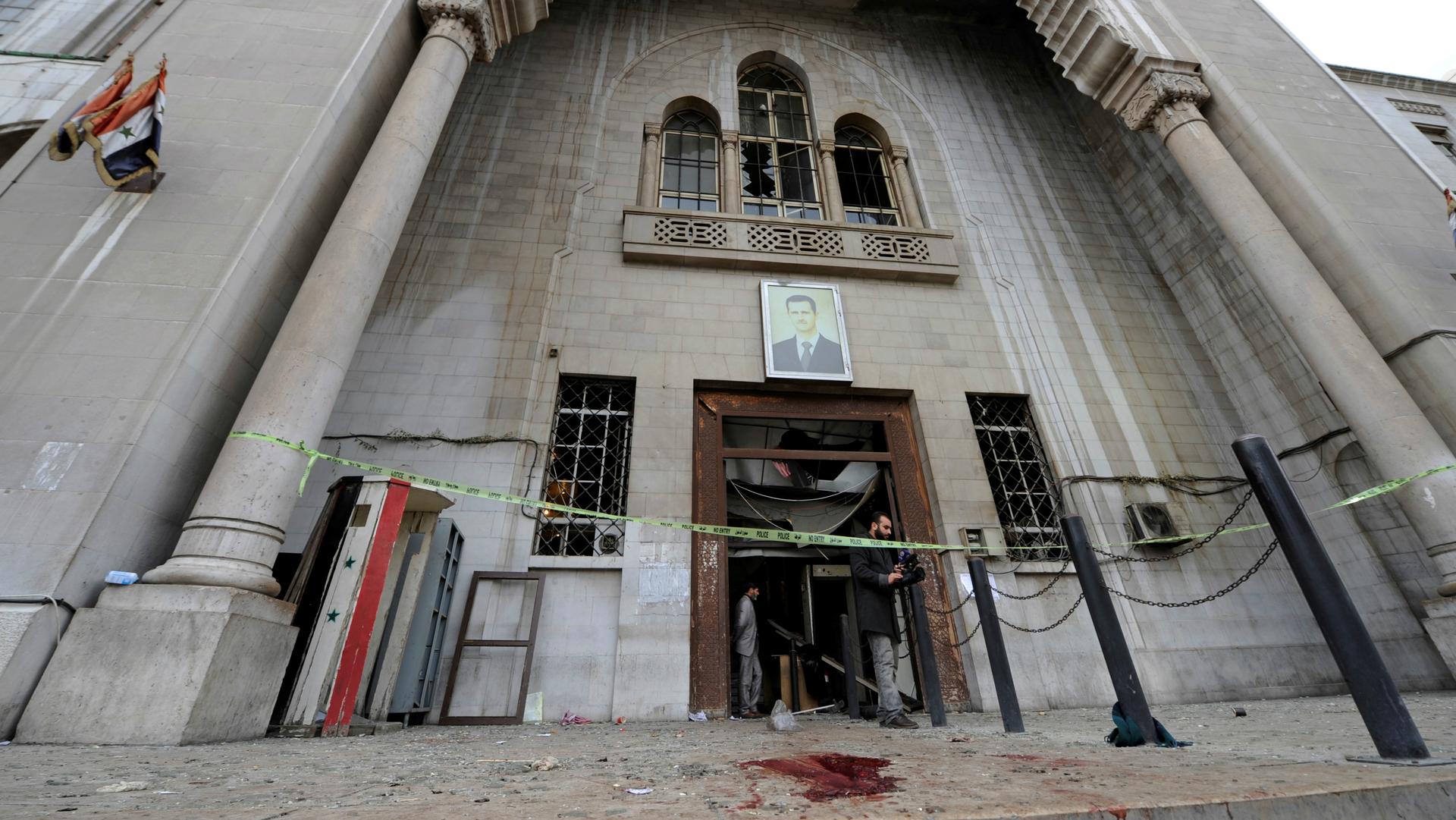Suicide bombing at Damascus courthouse kills dozens as Syrian civil war enters seventh year
The entrance of the Palace of Justice in Damascus, Syria, after a suicide bomber killed dozens there on March 15, 2017.
Two suicide bombings hit Damascus Wednesday including an attack at a central courthouse that killed at least 32 people, as Syria's war entered its seventh year with the regime now claiming the upper hand.
There was no immediate claim of responsibility for the blasts, the second wave of deadly attacks in the capital in less than a week after twin bombings killed 74 on Saturday.
But they came with the rebels fighting President Bashar al-Assad's regime increasingly divided and dispirited after a series of battlefield setbacks.
Negotiations to end the conflict have meanwhile made little progress, with rebels this week declining to attend negotiations in Kazakhstan.
Wednesday's first attack saw a suicide bomber rush inside the building and blow himself up when police tried to prevent him from entering the courthouse in the centre of Damascus, state media reported.
A police source told AFP that 32 people were killed and 100 wounded.
The second blast hit a restaurant in the western Rabweh neighbourhood, wounding 25 people, the source said.
"We were terrified because the sound of the explosion was enormous," a lawyer who was in the courthouse during the first attack told AFP.
"We took refuge in the library which is on a higher floor," the lawyer said, speaking on condition of anonymity. "It was a bloody scene."
State television broadcast scenes from the building showing blood smeared on the floor of the lobby but also splattered across its ceiling.
It interviewed a man receiving treatment with a bandage over his eye who said the attacker was wearing a military jacket.
"He had his hands up and screamed 'God is greatest' and then the blast happened," he told state television.
"I fell to the ground and blood came out of my eye."
AFP correspondents in Damascus said the streets emptied after the two blasts, with several roads also blocked by security forces.
Rebels under pressure
Damascus was already reeling from Saturday's bombings, which mainly killed Iraqi pilgrims in the city to visit Shiite shrines.
That attack was claimed by former al-Qaeda affiliate Fateh al-Sham Front, part of a rebel alliance that controls large parts of the northwestern Idlib province.
Rebel forces suffered a series of reversals during the sixth year of the war, including being forced from their onetime stronghold of east Aleppo in December.
The loss was an especially difficult blow to rebels who had imagined marching on Damascus in the early days of the civil war.
The conflict began in 2011 with peaceful demonstrations inspired by similar movements during the so-called "Arab Spring," calling on Assad to implement reforms.
They started on March 15 after the arrest and torture of a group of students from the southern province of Daraa accused of writing anti-Assad graffiti.
The protests were put down violently, prompting demonstrators to pick up weapons and causing the uprising to spiral into an increasingly complex and brutal civil war that has also drawn in regional and international players.
Rebel forces captured large parts of the country and several key cities. The Islamic State jihadist group emerged from the chaos to seize control of significant territory in Syria and neighbouring Iraq.
But a key turning point came in September 2015 when Russia began a military intervention in support of Assad's government, which has since regained much of the ground it lost.
Under pressure from air strikes by a US-led coalition, ISIS has also retreated to bastions like its de facto Syrian capital Raqa.
'Savage horror'
The conflict has killed more than 320,000 people, with over the half the country's population displaced either within Syria or becoming refugees.
The war has also ravaged the country's infrastructure and set the economy back decades.
"When we began to demonstrate, I never thought it would come to this. We thought it would end in two, three months, a year at most," Abdallah al-Hussein, a 32-year-old footballer from the town of Saraqeb in Idlib province, told AFP.
"Whether this war is ended with weapons or peacefully doesn't matter. People want to live in peace."
The brutality of the war has provoked international outcry, with the UN's High Commissioner for Human Rights Zeid Ra'ad al-Hussein this week describing the country as "a torture chamber, a place of savage horror and absolute injustice."
But the international community has remained divided between a pro-regime bloc led by Russia and Iran, and a pro-opposition bloc led by the United States, Turkey and Gulf nations, along with European countries.
In recent months the opposition's backers have dialled back their support, with Turkey now working with former rival Russia on peace talks and US President Donald Trump's administration showing little interest in the conflict or negotiations to end it.
Every day, reporters and producers at The World are hard at work bringing you human-centered news from across the globe. But we can’t do it without you. We need your support to ensure we can continue this work for another year.
Make a gift today, and you’ll help us unlock a matching gift of $67,000!
